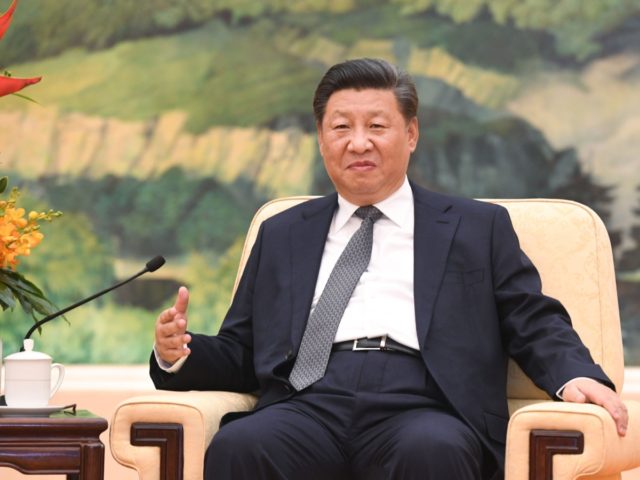Chinese dictator Xi Jinping applauded Communist Party officials in remarks this weekend for making western Xinjiang province, home to over 1,000 concentration camps for ethnic minorities, “united, harmonious, prosperous, and culturally advanced.”
Xi reportedly made the comments at a special meeting to discuss Party control of Xinjiang, China’s largest and westernmost province, on Saturday.
Xi’s regime implemented a policy of building camps to house Xinjiang’s majority Uyghur population – and other Muslim ethnic minority people such as Kazakhs and Kyrgyz people – that resulted in the widespread internment of as many as 3 million people beginning in late 2018. A significant percentage of those taken to the camps, which China refers to as “vocational training centers,” have disappeared, unable to contact their families. Some have escaped and said publicly that they experienced or witnessed extreme abuses such as torture, rape, forced sterilization, forced abortions, and infanticide. Others stated that the Communist Party enslaved them there and that they witnessed evidence concurrent with the harvesting of organs from live political prisoners for sale on the black market.
Xi’s remarks, as relayed in English by the state-run Xinhua News Agency, did not specifically mention the camps, but clearly addressed them as part of all the Party’s policies in Xinjiang, which he described as “perfectly right” and a “long-term” staple of government there. The Xinjiang concentration camps are the cornerstone of Communist Party policy in the region.
“Facts have fully proved that China’s work on ethnic affairs has been successful,” Xinhua quoted Xi as saying, applauding the “strong leadership” of the Communist Party in the Uyghur heartland. He also urged Party leaders nationwide to adopt the brutal policies implemented in Xinjiang and maintain “the correct political orientation.”
“Xi noted that the banner of socialist rule of law must be held high to maintain lasting social stability in Xinjiang, ensuring that the requirement for fully advancing China’s law-based governance covers all areas of the work related to Xinjiang,” Xinhua reported. “Xi stressed efforts to focus on heightening a sense of identity of the Chinese nation to constantly strengthen ethnic unity.”
Xi emphasized “education on the sense of Chinese identity,” meaning Communist Party policies to eradicate Uyghur language and culture and replace them in schools with Mandarin language instruction, the dominant language of the Han ethnic people in northeastern China, and Communist Party indoctrination.
Such indoctrination, Xi said, would help “the officials and the general public of all ethnic groups develop an accurate understanding of country, history, ethnicity, culture, and religion, to let the sense of Chinese identity take root in people.” He specifically advocated for the promotion of ethnic minority members of the Party to help enforce its ideology.
“Xi pointed out that the original aspiration and mission of the Party is to seek happiness for the Chinese people, including people of all ethnic groups in Xinjiang, and the rejuvenation of the Chinese nation, including various ethnic groups in Xinjiang,” according to Xinhua.
Xi Jinping rarely comments on the repressive Xinjiang policies personally. In July 2019, he reportedly addressed the issue with Crown Prince Mohammed bin Zayed al-Nahyan of the United Arab Emirates (UAE), thanking him for his support of Beijing despite the mass internment and enslavement of Muslims. Abu Dhabi reportedly responded in a statement that it “highly appreciates China’s efforts to protect the rights and interests of ethnic minorities.”
Later that year, Xi delivered a speech against all alleged separatist movements seeking to break with Beijing, which would include Uyghur separatists seeking to establish Xinjiang as the independent state of East Turkestan as well as the sovereign nation of Taiwan, which the Communist Party falsely claims as a rogue province. China also faces extreme rejection of Communist Party rule in Tibet, Inner Mongolia, and Hong Kong, which was until this year an autonomous community.
“Anyone who attempts to split any region from China will perish, with their bodies smashed and bones ground to powder,” Xi warned in that speech.
The Chinese state routinely defends its policy independent of personal statements from Xi through its many state media arms and, occasionally, through published human rights “white papers” that conclude the Communist Party has brought extreme joy and satisfaction to the Uyghur people.
The most recent “white paper,” published this month, found that the concentration camps helped implement a policy of “facilitation of employment.”
“Work creates the means of existence and is an essential human activity. It creates a better life and enables all-round human development and the progress of civilization,” the paper read. “China is committed to the people-centered philosophy of development, attaches great importance to job security, gives high priority to employment, and pursues a proactive set of policies on employment.”
The Chinese Foreign Ministry also routinely dismisses hard evidence of both the existence of its concentration camps and the abuses occurring therein.
“As we stated time and again, there was never any ‘detention camp’ in Xinjiang,” ministry spokesman Wang Wenbin said during his regular press conference on Friday, referring to a new report by the Australian Strategic Policy Institute (ASPI) indicating the expansion of the camps. “According to Chinese media reports, which have also been substantiated by netizens, the sites identified by the ASPI include an e-commerce park and a highly-rated residential zone. Such a shoddy report has no credibility at all, just as the institute that produces it.”
Follow Frances Martel on Facebook and Twitter.

COMMENTS
Please let us know if you're having issues with commenting.